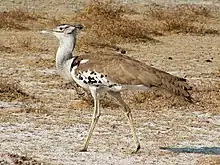bustard
English
Etymology
From Middle English bustarde, from an Anglo-Norman French blend of Old French bistarde and oustarde, both from Latin avis tarda ‘slow bird’; the name is unexplained, the bustards being swift runners.
Pronunciation
- IPA(key): /ˈbʌs.təd/
Noun
bustard (plural bustards)
Derived terms
- great bustard, Otis tarda
- little bustard, Tetrax tetrax
- Arabian bustard, Ardeotis arabs
- Australian bustard, Ardeotis australis
- black-bellied bustard, Lissotis melanogaster
- buff-crested bustard, Lophotis gindiana
- Denham's bustard, Neotis denhami
- great Indian bustard, Ardeotis nigriceps
- Hartlaub's bustard, Lissotis hartlaubii
- Heuglin's bustard, Neotis heuglinii
- houbara bustard, Chlamydotis undulata
- kori bustard, Ardeotis kori
- little brown bustard, Eupodotis humilis
- Ludwig's bustard, Neotis ludwigii
- Macqueen's bustard, Chlamydotis macqueenii
- Nubian bustard, Neotis nuba
- Savile's bustard, Lophotis savilei
- white-bellied bustard, Eupodotis senegalensis
Translations
any of several birds of the family Otididae
|
|
Irish
Etymology
Borrowed from English bustard, from Old French bistarde.
Declension
Declension of bustard
First declension
|
Bare forms:
|
Forms with the definite article:
|
Derived terms
- ar bustard (“in the lurch”)
Mutation
| Irish mutation | ||
|---|---|---|
| Radical | Lenition | Eclipsis |
| bustard | bhustard | mbustard |
| Note: Some of these forms may be hypothetical. Not every possible mutated form of every word actually occurs. | ||
References
- "bustard" in Foclóir Gaeilge-Béarla, An Gúm, 1977, by Niall Ó Dónaill.
This article is issued from Wiktionary. The text is licensed under Creative Commons - Attribution - Sharealike. Additional terms may apply for the media files.
